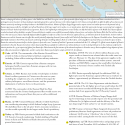 |
 |
Russia Security Update: February 17-24, 2016

Russia is reshaping the balance of military power in the Middle East and Black Sea region even as it faces potential defense budget cuts. Low oil prices and Western sanctions have caused a prolonged economic crisis in Russia, leading to new proposals for a 5 percent cut in the 2016 military budget. Russia continued efforts to offset the effects of low oil prices and Western sanctions by marketing its military hardware in the Middle East and Asia. Minister of Defense Sergey Shoygu made a surprise visit to Iran amidst reports over the potential sale of Russian supermaneuverable Su-30 fighter aircraft and the delivery of the long-range S-300 surface-to-air missile system, deals that may provide leverage in convincing Iran to support a Russian and Saudi-backed oil production freeze agreement. Russia is also heightening its military posture around Turkey as it shifts the balance of power in the Middle East. Russian officials revealed continued military buildup in occupied Crimea with plans to complete a new airfield, permanently deploy airborne forces, and reinforce the Russian Black Sea Fleet with two submarines in the next two years. Russia reportedly deployed additional fighter aircraft to its airbase near the Armenian capital of Yerevan, 15 kilometers from the Turkish border. A $200 million Russian arms credit to Armenia came into effect this month, potentially impacting Armenia’s frozen conflict with Turkish ally Azerbaijan over the Nagorno-Karabakh enclave. Russia presented a failed draft resolution to the UN Security Council condemning Turkey for its shelling of Kurdish forces in northern Syria, continuing efforts to portray Turkey as an obstacle to peace in Syria. Russia also continued to present itself as a broker of peace in Syria with a new “cessation of hostilities” agreement coordinated with the U.S., although U.S. officials remain skeptical of Russia’s commitment to the deal. Russian intervention in Syria has provided Moscow a platform to exhibit its new military hardware in order to develop military ties in Asia. Indonesia confirmed its intent to purchase Su-35 air superiority fighters from Russia after China became the first customer of the advanced warplanes in November 2015. Russia completed a large shipment of automatic rifles and ammunition to Afghanistan, another country where Russia may attempt to compete with the U.S. for influence.
By Franklin Holcomb and Hugo Spaulding